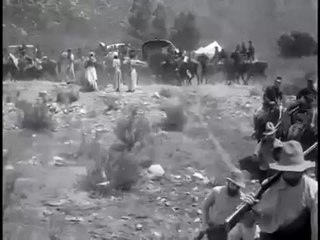Related Research Articles

Judith of Bethulia (1914) is an American film starring Blanche Sweet and Henry B. Walthall, and produced and directed by D. W. Griffith, based on the play "Judith and the Holofernes" (1896) by Thomas Bailey Aldrich, which itself was an adaptation of the Book of Judith. The film was the first feature-length film made by pioneering film company Biograph, although the second that Biograph released.
The Mirror is a 1913 short silent film directed by Anthony O'Sullivan.
Brute Force is a 1914 short silent drama film directed by D. W. Griffith, and starring Robert Harron and Mae Marsh. The film was shot in Chatsworth Park, Chatsworth, Los Angeles, California. It is a story of cavemen and dinosaurs, and perhaps the first live-action dinosaur film. It is a sequel to Griffith's earlier film, Man's Genesis (1912).

Oil and Water is a 1913 film directed by D. W. Griffith and starring Blanche Sweet. The supporting cast includes Henry B. Walthall, Lionel Barrymore, and Harry Carey. A stage dancer (Sweet) and a serious-type homebody (Walthall) discover, after marriage, that their individual styles don't mesh. The movie includes elaborate dance sequences.

The Battle is a 1911 American silent war film directed by D. W. Griffith. The film was set during the American Civil War. It was shot in Fort Lee, New Jersey, where many early film studios in America's first motion picture industry were based at the beginning of the 20th century. Prints of the film survive in several film archives around the world including the Museum of Modern Art, UCLA Film and Television Archive, George Eastman House, and the Filmoteca Española.

So Near, Yet So Far is a 1912 American silent drama film directed by D. W. Griffith. Prints of the film survive in the Museum of Modern Art film archive.

The Painted Lady is a 1912 American short drama film directed by D. W. Griffith and starring Blanche Sweet. A print of the film survives.

The Informer is a 1912 American short drama film directed by D. W. Griffith and featuring Mary Pickford, Henry B. Walthall, Harry Carey, Lionel Barrymore, Dorothy Gish, and Lillian Gish. It was filmed in the Pike County town of Milford, Pennsylvania. Prints of the film survive at the film archive of the Library of Congress.
My Hero is a 1912 American short silent Western film directed by D. W. Griffith and starring Dorothy Gish.
The God Within is a 1912 American short drama film directed by D. W. Griffith and starring Blanche Sweet. A print of the film survives.

Three Friends is a 1913 American short silent Western film directed by D. W. Griffith and starring Blanche Sweet.

A Chance Deception is a 1913 American drama film directed by D. W. Griffith and starring Blanche Sweet.
Love in an Apartment Hotel is a 1913 American drama film directed by D. W. Griffith and starring Blanche Sweet.
Broken Ways is a 1913 American short silent Western film directed by D. W. Griffith, starring Henry B. Walthall and Blanche Sweet. A print of the film survives.
Near to Earth is a 1913 American silent drama film directed by D. W. Griffith.
The Switch Tower is a 1913 American drama film featuring Lionel Barrymore and Harry Carey.
In Diplomatic Circles is a 1913 American drama film featuring Harry Carey.

Fighting Blood is a 1911 American short silent Western film directed by D. W. Griffith and starring George Nichols. It features Lionel Barrymore, Mae Marsh and Blanche Sweet. Lionel Barrymore's presence in the film is debatable as biographers say he's not in existing prints. A print of the film survives in the film archive of George Eastman House Motion Picture Collection.
The Chief's Blanket is a 1912 American short silent Western film directed by D. W. Griffith, starring Blanche Sweet and Lionel Barrymore.

The Massacre is a 1912 American silent Western film directed by D. W. Griffith and released by Biograph Studios. It stars Blanche Sweet and Wilfred Lucas. The film was shot in 1912 and released in Europe that year, but not released in the United States until 1914.